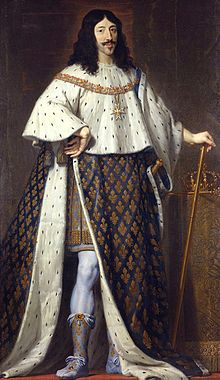King Louis XIII
| Louis XIII | |
|---|---|

King Louis XIII
(by Philippe de Champaigne, c. 1630-1639) |
|
| King of France and Navarre | |
| Reign | 14 May 1610 – 14 May 1643 |
| Coronation | 17 October 1610 |
| Predecessor | Henry IV and III |
| Successor | Louis XIV |
| Regent | Marie de' Medici (1610–14) |
| Born |
27 September 1601 Château de Fontainebleau, France |
| Died | 14 May 1643 (aged 41) Saint-Germain-en-Laye, France |
| Burial | Basilica of St Denis, France |
| Spouse | Anne of Austria |
| Issue |
Louis XIV of France Philippe I, Duke of Orléans |
| House | Bourbon |
| Father | Henry IV of France |
| Mother | Marie de' Medici |
| Religion | Roman Catholicism |
Louis XIII (27 September 1601 – 14 May 1643) was a monarch of the House of Bourbon who ruled as King of France from 1610 to 1643 and King of Navarre (as Louis II) from 1610 to 1620, when the crown of Navarre was merged with the French crown.
Shortly before his ninth birthday, Louis became king of France and Navarre after his father Henry IV was assassinated. His mother, Marie de' Medici, acted as regent during his minority. Mismanagement of the kingdom and ceaseless political intrigues by Marie and her Italian favourites led the young king to take power in 1617 by exiling his mother and executing her followers, including Concino Concini, the most influential Italian at the French court.
Louis XIII, taciturn and suspicious, relied heavily on his chief ministers, first Charles d'Albert, duc de Luynes then Cardinal Richelieu, to govern the kingdom of France. King and cardinal are remembered for establishing the Académie française, and ending the revolt of the French nobility. The reign of Louis "the Just" was also marked by the struggles against Huguenots and Habsburg Spain.
France's greatest victory in the conflicts against the Habsburg Empire during the period 1635–59 came at the Battle of Rocroi (1643), five days after Louis's death caused by apparent complications of intestinal tuberculosis. This battle marked the end of Spain's military ascendancy in Europe and foreshadowed French dominance in Europe under Louis XIV, his son and successor.
Born at the Château de Fontainebleau, Louis XIII was the oldest child of King Henry IV of France and his second wife Marie de' Medici. As son of the king, he was a Fils de France ("son of France"), and as the eldest son, Dauphin of France. His father Henry IV was the first French king of the House of Bourbon, having succeeded his ninth cousin, Henry III of France (1574–1589), in application of Salic law. Louis XIII's paternal grandparents were Antoine de Bourbon, duc de Vendôme, and Jeanne d'Albret, Queen of Navarre. His maternal grandparents were Francesco I de' Medici, Grand Duke of Tuscany, and Joanna of Austria, Grand Duchess of Tuscany. Eleonora de' Medici, his maternal aunt, was his godmother.
...
Wikipedia
